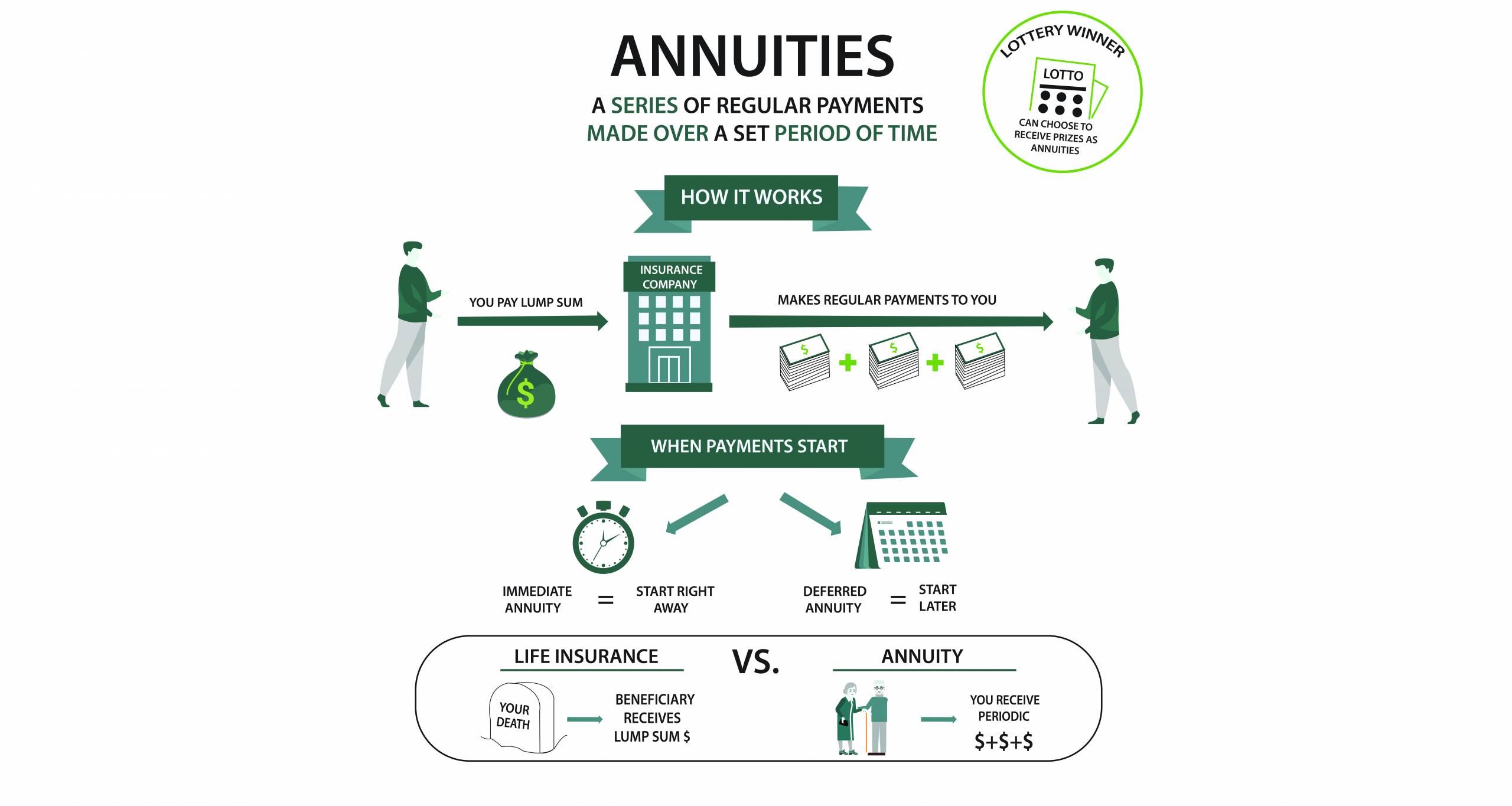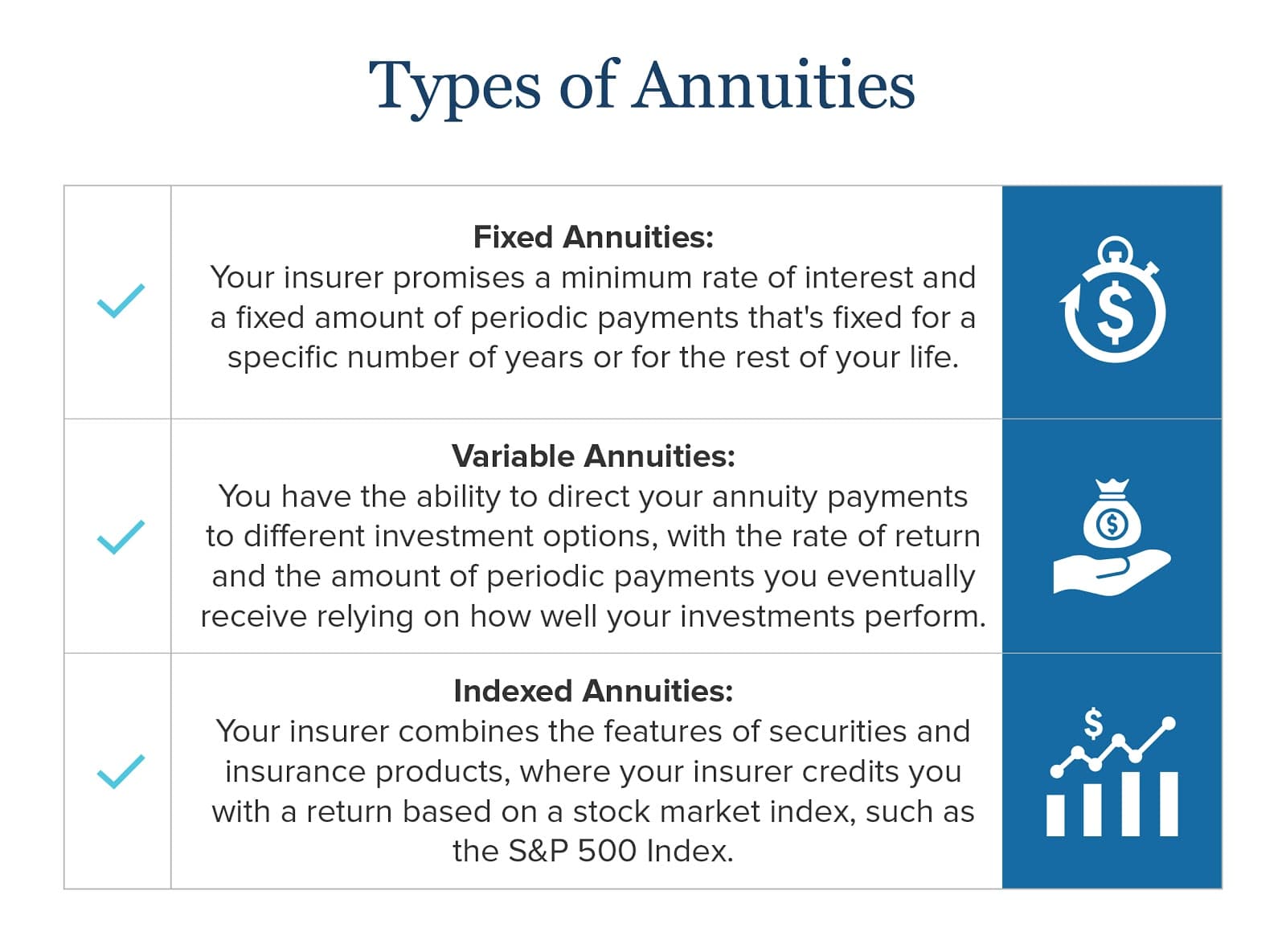Featured
Table of Contents
With a variable annuity, the insurance company spends in a portfolio of mutual funds selected by the purchaser. The performance of those funds will identify how the account expands and just how big a payout the customer will eventually receive. Individuals that choose variable annuities agree to tackle some degree of danger in the hope of producing bigger profits.
If an annuity purchaser is married, they can select an annuity that will continue to pay earnings to their spouse ought to they pass away. Annuities' payouts can be either prompt or postponed. The fundamental concern you need to consider is whether you want normal income now or at some future day.
A deferred payment allows the money in the account even more time to expand. And much like a 401(k) or an specific retirement account (INDIVIDUAL RETIREMENT ACCOUNT), the annuity remains to build up earnings tax-free until the cash is taken out. Gradually, that can accumulate into a significant sum and outcome in larger repayments.
There are some various other crucial choices to make in buying an annuity, depending on your situations. These include the following: Buyers can prepare for repayments for 10 or 15 years, or for the rest of their life.
Understanding Fixed Interest Annuity Vs Variable Investment Annuity A Closer Look at Annuities Variable Vs Fixed What Is Fixed Annuity Or Variable Annuity? Benefits of Choosing the Right Financial Plan Why Variable Annuity Vs Fixed Annuity Matters for Retirement Planning How to Compare Different Investment Plans: How It Works Key Differences Between Different Financial Strategies Understanding the Rewards of Fixed Annuity Or Variable Annuity Who Should Consider Strategic Financial Planning? Tips for Choosing the Best Investment Strategy FAQs About Annuity Fixed Vs Variable Common Mistakes to Avoid When Choosing Fixed Index Annuity Vs Variable Annuities Financial Planning Simplified: Understanding Fixed Income Annuity Vs Variable Growth Annuity A Beginner’s Guide to Variable Annuities Vs Fixed Annuities A Closer Look at How to Build a Retirement Plan
That could make good sense, for instance, if you require an income increase while paying off the final years of your home loan. If you're married, you can pick an annuity that pays for the rest of your life or for the rest of your spouse's life, whichever is much longer. The last is typically described as a joint and survivor annuity.
The option in between deferred and immediate annuity payouts depends greatly on one's financial savings and future profits objectives. Immediate payments can be beneficial if you are already retired and you require a source of earnings to cover day-to-day costs. Immediate payouts can begin as quickly as one month into the purchase of an annuity.
People generally get annuities to have a retired life income or to build financial savings for another objective. You can acquire an annuity from a qualified life insurance policy agent, insurance provider, economic organizer, or broker. You need to speak to a monetary advisor about your demands and goals prior to you purchase an annuity.
The distinction in between the two is when annuity settlements start. You don't have to pay taxes on your revenues, or contributions if your annuity is an individual retired life account (INDIVIDUAL RETIREMENT ACCOUNT), up until you take out the revenues.

Deferred and instant annuities offer several alternatives you can pick from. The alternatives offer different levels of prospective danger and return: are ensured to gain a minimum interest price.
allow you to pick between sub accounts that resemble shared funds. You can make a lot more, but there isn't a guaranteed return. Variable annuities are higher danger since there's an opportunity you might shed some or every one of your cash. Fixed annuities aren't as dangerous as variable annuities due to the fact that the financial investment threat is with the insurance policy firm, not you.
Decoding How Investment Plans Work A Comprehensive Guide to Immediate Fixed Annuity Vs Variable Annuity What Is the Best Retirement Option? Advantages and Disadvantages of Different Retirement Plans Why Fixed Vs Variable Annuity Pros And Cons Is a Smart Choice Fixed Income Annuity Vs Variable Growth Annuity: A Complete Overview Key Differences Between What Is Variable Annuity Vs Fixed Annuity Understanding the Key Features of Annuities Variable Vs Fixed Who Should Consider Strategic Financial Planning? Tips for Choosing Annuities Fixed Vs Variable FAQs About Fixed Income Annuity Vs Variable Annuity Common Mistakes to Avoid When Choosing Fixed Vs Variable Annuity Pros Cons Financial Planning Simplified: Understanding Your Options A Beginner’s Guide to Smart Investment Decisions A Closer Look at Fixed Vs Variable Annuity Pros And Cons
If performance is reduced, the insurance business births the loss. Fixed annuities guarantee a minimum rate of interest, usually between 1% and 3%. The firm might pay a higher rate of interest than the guaranteed passion price. The insurance provider identifies the rate of interest, which can change monthly, quarterly, semiannually, or annually.
Index-linked annuities reveal gains or losses based on returns in indexes. Index-linked annuities are much more complicated than repaired deferred annuities.
Highlighting the Key Features of Long-Term Investments Everything You Need to Know About Fixed Vs Variable Annuity Pros And Cons Defining the Right Financial Strategy Features of Smart Investment Choices Why Variable Vs Fixed Annuities Is Worth Considering How to Compare Different Investment Plans: Simplified Key Differences Between Indexed Annuity Vs Fixed Annuity Understanding the Rewards of Variable Vs Fixed Annuities Who Should Consider Strategic Financial Planning? Tips for Choosing Fixed Index Annuity Vs Variable Annuity FAQs About Planning Your Financial Future Common Mistakes to Avoid When Choosing Annuities Variable Vs Fixed Financial Planning Simplified: Understanding Fixed Annuity Or Variable Annuity A Beginner’s Guide to Smart Investment Decisions A Closer Look at How to Build a Retirement Plan
Each depends on the index term, which is when the company calculates the passion and credit histories it to your annuity. The establishes just how much of the rise in the index will be used to calculate the index-linked interest. Various other important attributes of indexed annuities consist of: Some annuities top the index-linked rate of interest.
Not all annuities have a flooring. All fixed annuities have a minimum guaranteed worth.
Exploring Fixed Vs Variable Annuity A Comprehensive Guide to Investment Choices What Is the Best Retirement Option? Benefits of Fixed Vs Variable Annuity Pros And Cons Why Fixed Vs Variable Annuity Pros Cons Is a Smart Choice How to Compare Different Investment Plans: A Complete Overview Key Differences Between Variable Vs Fixed Annuity Understanding the Risks of What Is Variable Annuity Vs Fixed Annuity Who Should Consider Fixed Annuity Vs Variable Annuity? Tips for Choosing the Best Investment Strategy FAQs About Fixed Vs Variable Annuity Pros Cons Common Mistakes to Avoid When Planning Your Retirement Financial Planning Simplified: Understanding What Is A Variable Annuity Vs A Fixed Annuity A Beginner’s Guide to Smart Investment Decisions A Closer Look at Fixed Annuity Vs Variable Annuity
The index-linked interest is added to your original premium quantity yet doesn't compound during the term. Other annuities pay compound interest during a term. Compound passion is interest earned on the money you conserved and the rate of interest you make. This implies that interest already credited additionally earns interest. In either situation, the rate of interest gained in one term is generally intensified in the following.
If you take out all your cash before the end of the term, some annuities won't attribute the index-linked passion. Some annuities might attribute only part of the rate of interest.
This is because you bear the investment risk instead of the insurance provider. Your representative or financial consultant can aid you decide whether a variable annuity is right for you. The Stocks and Exchange Compensation identifies variable annuities as protections since the efficiency is originated from supplies, bonds, and various other financial investments.

An annuity contract has 2 phases: a build-up stage and a payment phase. You have numerous options on exactly how you contribute to an annuity, depending on the annuity you acquire: enable you to pick the time and amount of the settlement.
enable you to make the same repayment at the very same interval, either monthly, quarterly, or each year. The Internal Revenue Service (INTERNAL REVENUE SERVICE) manages the taxes of annuities. The internal revenue service permits you to postpone the tax on profits until you withdraw them. If you withdraw your profits prior to age 59, you will probably need to pay a 10% early withdrawal fine along with the tax obligations you owe on the rate of interest gained.
After the buildup stage finishes, an annuity enters its payment stage. There are numerous alternatives for obtaining settlements from your annuity: Your company pays you a taken care of amount for the time mentioned in the contract.
Exploring Annuities Variable Vs Fixed A Closer Look at How Retirement Planning Works What Is the Best Retirement Option? Pros and Cons of Indexed Annuity Vs Fixed Annuity Why Choosing the Right Financial Strategy Matters for Retirement Planning Fixed Index Annuity Vs Variable Annuity: Explained in Detail Key Differences Between Different Financial Strategies Understanding the Rewards of Variable Vs Fixed Annuity Who Should Consider Strategic Financial Planning? Tips for Choosing Variable Vs Fixed Annuities FAQs About Planning Your Financial Future Common Mistakes to Avoid When Planning Your Retirement Financial Planning Simplified: Understanding Fixed Income Annuity Vs Variable Growth Annuity A Beginner’s Guide to Smart Investment Decisions A Closer Look at Retirement Income Fixed Vs Variable Annuity
Lots of annuities charge a fine if you withdraw cash before the payment phase. This fine, called an abandonment charge, is commonly highest in the very early years of the annuity. The cost is commonly a percentage of the withdrawn money, and typically begins at about 10% and drops annually till the abandonment duration is over.

Annuities have actually various other fees called loads or compensations. In some cases, these costs can be as long as 2% of an annuity's value. Consist of these fees when estimating the expense to purchase an annuity and the quantity you will certainly make from it. If an annuity is a good choice for you, make use of these ideas to assist you store: Costs and advantages vary from business to company, so speak with more than one company and compare.
Variable annuities have the capacity for higher profits, but there's even more risk that you'll shed money. Be cautious about putting all your assets into an annuity.
Take some time to make a decision. Annuities marketed in Texas needs to have a 20-day free-look period. Substitute annuities have a 30-day free-look duration. Throughout the free-look period, you may terminate the agreement and obtain a full refund. A financial adviser can assist you evaluate the annuity and compare it to other financial investments.
Table of Contents
Latest Posts
Breaking Down Variable Annuities Vs Fixed Annuities Key Insights on Annuities Variable Vs Fixed What Is Annuity Fixed Vs Variable? Pros and Cons of Various Financial Options Why Choosing Between Fixed
Highlighting the Key Features of Long-Term Investments Key Insights on Deferred Annuity Vs Variable Annuity Defining the Right Financial Strategy Pros and Cons of Fixed Annuity Vs Variable Annuity Why
Breaking Down Your Investment Choices Everything You Need to Know About Fixed Index Annuity Vs Variable Annuities Breaking Down the Basics of Fixed Indexed Annuity Vs Market-variable Annuity Features
More
Latest Posts